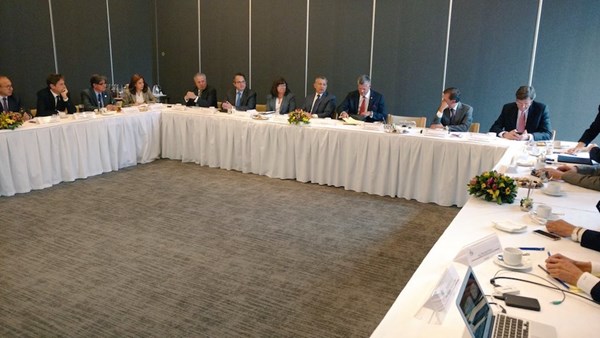Canadian, Mexican and U.S. Plastics Organizations Meet to Modernize NAFTA
The heads of PLASTICS, CPIA and ANIPAC met this week in Mexico City to reexamine the trade deal 24 years after it passed and before President Trump focuses on it.
Leaders from the Plastics Industry Association (PLASTICS), Canadian Plastics Industry Association (CPIA) and Mexico’s national plastics association, ANIPAC, held what PLASTICS President and CEO Bill Carteuax called a “marathon session” on July 5 to seek ways to update the North American Free Trade Agreement, which turns 25 next year.
Just boarded a flight to Mexico City for a Plastics NAFTA Summit with our friends from Canada 🇨🇦 and Mexico 🇲🇽. @PLASTICS_US #fairtrade
— Bill Carteaux (@bcarteaux) July 4, 2017
Finished marathon session with @CPIA_ACIP @ANIPAC_AC and @PLASTICS_US on modernizing NAFTA for the N.A. Plastics Industry. Outcome tomorrow! pic.twitter.com/9GIfPsqaTj
— Bill Carteaux (@bcarteaux) July 6, 2017
These associations, all of which have seen their domestic plastics industries benefit from NAFTA, are bringing focus to the issue ahead of U.S. President Donald Trump’s calls to renegotiate the deal. Trump formally launched a renegotiation of NAFTA in May, walking back some of his more strident speech on the topic in April. I looked at the potential impact of Trump following up on his campaign rhetoric regarding NAFTA back in December.
Right on its website, PLASTICS spells out its support of trade liberalization globally as a means to benefit the U.S. plastics industry:
The Plastics Industry Association (PLASTICS) supports the U.S. government’s efforts to achieve trade liberalization abroad that allows U.S. plastics manufacturers to expand their sales and operations. As part of its International Trade Policy, PLASTICS urges the government to engage in a comprehensive approach to reducing and eliminating foreign trade barriers.
In June, the German Plastics Machinery Association (VDMA) released its most recent trade data, pointing out strong growth in many areas, including the U.S. (its top market; Trump took issue with the number of cars Germany exports to the U.S.). VDMA also noted that Britain, which unilaterally pulled out of the European Union, an agreement which had given it unfettered trade access to the continent, was already seeing the effects of its “Brexit”. Great Britain is working to renegotiate individual trade deals with its European partners.
“In Britain, on the other hand, the effects of Brexit are slowly being felt,” says Thorsten Kühmann, Managing Director of the VDMA Plastics and Rubber Machinery Association in his trend analysis. Exports fell in the first quarter by 31 per cent, resulting in that market dropping from 4th to 8th place among the major plastics and rubber machinery buying countries.
In more recent days, Germany has talked about direct trade deals with Mexico and China, opening itself up as the U.S. appears to hunker down. One can hope the hard work by the leadership of PLASTICS, CPIA and ANIPAC will help the Trump administration see the value in NAFTA.

Related Content
-
Cross-Linkable Formulations for Photovoltaic Cables
Avient’s Eccoh XL 8148 PE-based formulations support the rising need for solar power generation.
-
Ineos Nitriles Launches Biobased Acrylonitrile
The company’s Invireo is said to deliver a 90% lower carbon footprint compared to conventionally produced acrylonitrile.
-
Plastic Compounding Market to Outpace Metal & Alloy Market Growth
Study shows the plastic compounding process is being used to boost electrical properties and UV resistance while custom compounding is increasingly being used to achieve high-performance in plastic-based goods.
















